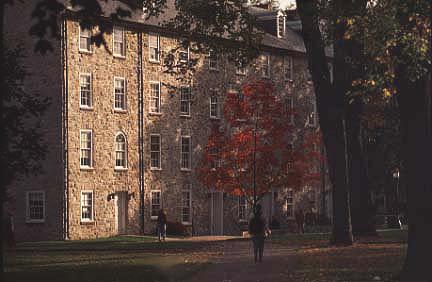East College To Be Closed Over Summer to Remove Asbestos

Plans to close East College for asbestos abatement this summer will force professors to temporarily relocate their offices.
“Asbestos is located in several areas within East College (attic, basement and several chases) that are accessed by maintenance staff,” explained Associate Vice President of Facilities Kristen Kostecky. Chases are “where pipes run between floors” she stated.
Kostecky added that “The primary purpose of the project is to abate (remove) that asbestos…No repairs are planned. The project is strictly to abate.”
To remove the asbestos, East College will close for the summer and professors will have to relocate their offices during the abatement period. Kostecky says that although professors whose offices are in the building were notified via email on Tuesday, April 10 that they must be out of their offices by Tuesday, May 22 and will not have access to their offices until the end of July. “The office relocation plan has not been finalized,” she explained.
The email, sent by Kostecky, stated that “Over summer break, Facilities Management will be working with an outside contractor to remove asbestos containing material (ACM) from certain areas in East College, primarily the attic and basement. Several mechanical spaces behind walls that are accessed by facilities staff will also be included. Most of the ACM is fire-proofing material on steel beams and columns. While ACM can remain in place and is not an issue unless disturbed, the [c]ollege is performing abatements as a proactive measure to improve buildings on campus.”
The email also explains why East College will need to be vacant during the abatements. “Because the work will disturb the ACM,” wrote Kostecky, “entry into the building by anyone other than specifically authorized personnel from facilities or the contractor will not be permitted. Also, as a practical matter, the work needs to be performed while the building is vacant. For example, the air handling unit will be disabled and no air conditioning will be available. There will also be periodic electrical shutdowns, and fire alarm systems will be inoperable.”
For Carol Ann Johnston, professor of English, this means packing a large quantity of books. “I have about 1000 books in my office,” she said, “and I can’t pack them prior to turning in final grades. I don’t know what to do.” She continues, “My impression is that there will be a fine dust everywhere, so if I can’t pack my office, stuff will be ruined.”
Scott Farrington, associate professor of classical studies, says he will not be affected by the closure of East College because, “this summer my pre-tenure sabbatical begins, and I will be doing research away from Carlisle anyway.”
Farrington cautioned that “The insidious thing about asbestos, like radon, is that it is very easy to ignore because it is invisible. I would never even sit next to a person who is smoking a cigarette, but I routinely shrug off things that are no less dangerous, like asbestos and radon.” However, he emphasized that “the college has recently addressed radon levels in this building (and on campus generally), and–despite my natural distrust of authority–I believe the administration when they say that East College is safe.”
Susan Feldman, professor of philosophy, noted that this need to relocate for the summer is “disruptive, since many of us (me included) routinely work in our offices all summer, researching and writing papers or books, as well as doing course prep for the upcoming semester. It means that we have to move all the books, papers and journals we will need for our scholarship before grades are due, along with our computers, to destinations as of yet unknown.” She also worries, “whether the contractor will in fact finish by the end of July— last year, an elevator installation in the building started several months late and lasted far past its projected completion date.”
Daniel Cozort is also hoping that the projected completion date will be accurate as he “remember[s] that the elevator replacement [in East College] last summer was complicated by [the] presence [of asbestos], so that the project took a lot longer than it might have otherwise, and that did complicate things for me since I had to move my fall classes to Althouse and was not able to go to my office until November.”
This time around, however, Cozort believes that “If the building is open again by August, it won’t make any difference to me. I will just make sure that I remove some books and my geraniums from my office during May.” Cozort says this is because he is “accustomed to doing most of my work at home and a lot of the research I plan to do over the summer will utilize online sources or material I’ll get through inter-library loan.”
“But,” continued Cozort, “if, like last year, they have unanticipated problems, and East College is still closed at the end of August, it will be really hard for everyone.”
Christopher Francese, professor of classical studies, also noted the inconvenience but emphasized that professors will be able to manage for the summer, saying, “It’s going to be a pain, but we’ll will cope.”



